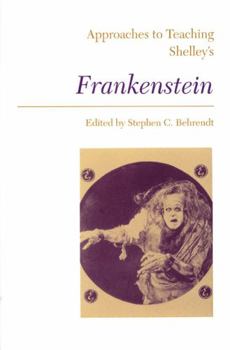Approaches to Teaching Shelley's Frankenstein
Select Format
Select Condition 
Book Overview
Now at seventy-three volumes, this popular MLA series (ISSN 10591133) addresses a broad range of literary texts. Each volume surveys teaching aids and critical material and brings together essays that... This description may be from another edition of this product.
Format:Paperback
Language:English
ISBN:087352540X
ISBN13:9780873525404
Release Date:January 1990
Publisher:Modern Language Association of America
Length:190 Pages
Weight:0.60 lbs.
Dimensions:0.5" x 5.6" x 9.2"
Related Subjects
Criticism & Theory Education Education & Reference European History & Criticism Instruction Methods Language Arts Literary Criticism Literary Criticism & Collections Literature & Fiction Schools & Teaching Science Fiction Textbooks World Literature Writing Writing, Research & Publishing GuidesCustomer Reviews
2 ratings
Good source for a paper
Published by Thriftbooks.com User , 18 years ago
This is the original story with a nice collection of notes and analyses.
Friendship, ambition, and the conflict between the two.
Published by Thriftbooks.com User , 22 years ago
The novel Frankenstein conveys the themes of friendship, ambition, and the conflict between the two. The message is that the deeper need of the two is friendship, but that we are susceptible to the temptations of ambition, which can destroy friendship. Ostensibly, Victor Frankenstein had an unselfish mission to "benefit all mankind" with his scientific project. His "selfless" ambition failed him and proved to aim at self-glory because he wanted to create a race that would bless him as its father. In Captain Walton's second letter to his sister, we learn that although he has a well-trained crew, he has no soul companion; this need he regards as a "most severe evil." Walton's exploration of the secluded and frozen Arctic serves as a metaphor for how his ambition has removed him from society. His ambition even threatened his own and his crew members' lives when ice surrounded and trapped his boat. The message is that if one sets out ambitiously to benefit mankind, once that person has acheived their goal, their prominence sets them apart from the same society they set out to benefit. Victor had a much more intense ambition than Walton, with corespondingly more disasterous results. As Frankenstein prepared for his project, he isolated himself from his friends and family to laboriously study the sciences and he would later postpone his marriage for this project. The embodiment of his ambition, the repulsive monster, would eventually slay several of Victor's loved family members, including his fiance on their wedding night. Even the monster feels as his deepest need a human relationship, which he has none. While observing an impoverished family, "the bitter gall of envy" arose in the monster. He considers them rich because they have the companionship of each other even though they are in financial poverty. When Frankenstein rejects the monster's pleas to create for him a mate of the same race, the monster sets out on an unstoppable path to destruction and an ambitious one indeed. The novel links ambition with destruction, particularly destruction of companionship and conveys friendship as a great need for mankind. I don't think the story conveys that all ambition is destructive. At the end of the story, Victor has great regret for the results of his ambition, but he still has pride for his effort. Although he cautions us that we would be better off to believe our "native town to be the world," he adds, "yet another may succeed." You could interpret this as Victor not "learning his lesson;" that mankind will continue to give in to harmful passions. Another, much different analysis could be that this story portrays that limited ambition, integrated with society and not aimed at self-glory, can be virtuous. After all, for the teenage author of a classic, enduring novel to tell us that all ambition will destroy us would be a contradiction.





